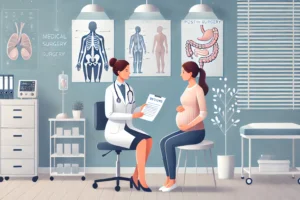Introduction
A. Purpose of the article
Pregnancy is a crucial period in a woman’s life marked by significant physiological changes that affect her nutritional needs [1]. This article aims to provide expectant mothers, their families, and those planning for pregnancy with comprehensive information about what foods to eat mostly during pregnancy. By outlining the essential nutrients, providing a list of beneficial foods, and highlighting those to avoid, this article will serve as a practical guide for maintaining a balanced and healthy diet during pregnancy.
B. Importance of nutrition during pregnancy
Adequate nutrition during pregnancy plays a pivotal role not only in maintaining the mother’s health but also in the development and wellbeing of the fetus [2]. Eating a balanced diet ensures the provision of necessary vitamins, minerals, and other nutrients crucial for fetal growth, including brain development, bone health, and immune system formation [3]. Moreover, a well-rounded diet can help manage pregnancy symptoms, maintain maternal energy levels, and possibly even impact the future health of the child [4]. Therefore, understanding and incorporating the right foods into the diet can significantly contribute to a healthy pregnancy and a healthier baby [5].
The Importance of a Balanced Diet during Pregnancy
A. Nutritional demands of pregnancy
During pregnancy, the nutritional requirements of the body change and increase to support fetal development and maternal health [6]. Energy needs rise particularly in the second and third trimesters, necessitating an increase in daily caloric intake. There’s also a heightened demand for certain nutrients such as protein, iron, calcium, folic acid, and iodine, which play crucial roles in fetal growth and maternal wellbeing [7]. It’s worth noting that while nutrient needs increase, this doesn’t necessarily mean ‘eating for two’ in terms of caloric intake. Rather, it’s about enhancing the nutritional quality of the diet to meet these demands.
B. Impact of nutrition on fetal development
Proper nutrition during pregnancy can significantly impact the growth and development of the fetus [8]. Nutrients like folic acid are crucial for neural tube formation, preventing neural defects in the early stages of pregnancy [9]. Iron supports the fetus’s expanding blood volume and the development of the placenta [10]. Protein is essential for the growth of fetal tissues, including the brain. Inadequate nutrition or deficiencies can potentially lead to complications such as low birth weight, premature birth, and developmental issues [11].
Macronutrients: What They Are and Why They Matter
A. Proteins
Proteins are essential nutrients that provide the building blocks – amino acids – for the body’s structures, including muscles, skin, hair, and body organs [12]. During pregnancy, proteins are particularly vital as they support the rapid growth of the fetus and maternal tissues, and contribute to the increased blood supply needed to support the developing placenta [13]. Pregnant women are recommended to consume an additional 25g of protein per day, which can be sourced from lean meats, dairy, eggs, legumes, and nuts [14].
B. Carbohydrates
Carbohydrates are the body’s primary source of energy and are critical for the growth and development of the fetus and placenta [15]. Complex carbohydrates like whole grains, fruits, and vegetables are particularly beneficial as they also provide dietary fiber, which helps prevent constipation, a common issue during pregnancy [16]. Additionally, these foods are rich in vitamins and minerals necessary for fetal development.
C. Fats
Fats are a concentrated source of energy and aid in the absorption of fat-soluble vitamins A, D, E, and K. Some fats, especially omega-3 fatty acids, are crucial for the development of the baby’s brain and eyes [17]. Sources of healthy fats include avocados, nuts, seeds, olive oil, and fatty fish such as salmon and sardines [18]. However, intake of trans fats and excess saturated fats should be avoided, as they can lead to unhealthy weight gain and increased risk of cardiovascular disease.
Micronutrients: Essential Vitamins and Minerals
A. Iron
Iron is a critical micronutrient, especially during pregnancy due to increased blood volume and the growing needs of the fetus and placenta [19]. Iron helps in the formation of hemoglobin, which transports oxygen throughout the body. Iron deficiency can lead to anemia, premature delivery, and low birth weight [20]. Pregnant women can obtain iron from lean meats, seafood, beans, leafy green vegetables, and iron-fortified cereals [21].
B. Calcium
Calcium is necessary for the development of the baby’s bones and teeth, heart, nerves, and muscles [22]. If the mother does not consume enough calcium, her body will provide it from her own bones, which can affect her health in the long run [23]. Dairy products, fortified plant milks, tofu, sesame seeds, and leafy greens are excellent sources of calcium.
C. Folic Acid
Folic acid, a type of B vitamin, is crucial in the early stages of pregnancy to prevent neural tube defects, such as spina bifida, in the baby. Women planning to become pregnant are often advised to take a folic acid supplement, but it can also be found in foods like leafy green vegetables, fortified cereals, legumes, and citrus fruits.
D. Vitamin D
Vitamin D helps the body absorb calcium, contributing to the baby’s bone growth. Lack of vitamin D during pregnancy can lead to gestational diabetes, preeclampsia, and low birth weight [24]. Few foods contain vitamin D naturally, but it can be found in fatty fish, eggs, fortified dairy products, and supplements.
E. Iodine
Iodine is necessary for the synthesis of thyroid hormones, which regulate the baby’s brain and nervous system development. Iodine deficiency can lead to miscarriage, preterm delivery, and cretinism in the newborn [25]. Seafood, dairy products, and iodized salt are good sources of iodine [38].
F. Other essential vitamins and minerals
There are other micronutrients, like vitamin A, vitamin C, zinc, and magnesium, that contribute to a healthy pregnancy by supporting immune function, preventing cell damage, aiding in cell growth and muscle function, respectively. A balanced diet rich in fruits, vegetables, whole grains, lean proteins, and dairy should provide these nutrients in adequate amounts.
Hydration: The Role of Water in Pregnancy
A. Importance of Hydration
Hydration plays a vital role during pregnancy for both the mother and the baby. It aids in the formation of the amniotic fluid, the delivery of nutrients to the fetus, digestion, and the elimination of waste and toxins [26]. Dehydration during pregnancy can lead to serious complications, such as low amniotic fluid, inadequate breast milk production, and even premature labor.
B. How Much Water to Drink
While the exact amount can vary based on factors such as body weight and climate, pregnant women are generally recommended to consume at least 8-10 cups of fluids daily, including all beverages and water-rich foods. It’s also important to note that pregnant women might need more fluids if they are physically active, live in hot climates, or are experiencing symptoms such as vomiting due to morning sickness.
Foods to Include in a Pregnancy Diet
A. What Constitutes a Pregnancy-Friendly Diet?
A pregnancy-friendly diet is one that meets the increased nutritional needs during pregnancy, ensuring optimum health for both the mother and the baby. This includes a balanced intake of protein, carbohydrates, and fats, as well as essential vitamins and minerals [27]. Regular hydration is also crucial. It’s important to have a variety of food sources to ensure a broad spectrum of nutrients [28].
B. Healthy Food Examples and Their Benefits
- Whole Grains: Whole grains like oats, brown rice, and whole wheat bread are excellent sources of fiber, helping with digestion and preventing constipation, a common issue during pregnancy. They also provide essential nutrients like B vitamins and iron.
- Lean Proteins: Foods like lean meat, poultry, fish, eggs, and legumes provide essential amino acids necessary for the growth of the fetus.
- Question: Can I eat seafood during pregnancy?
- Yes, pregnant women can eat seafood, but it’s crucial to choose low-mercury fish, such as salmon, sardines, and trout, due to the risk of mercury toxicity. Seafood is a great source of omega-3 fatty acids, which are important for brain development.
- Fruits and Vegetables: These provide a wide variety of vitamins, minerals, and fibers. Eating a rainbow of fruits and vegetables can ensure a diverse nutrient intake.
- Question: Are organic foods better for my baby?
- Organic foods can have fewer pesticide residues compared to conventionally grown produce. However, consuming a variety of fruits and vegetables, whether organic or conventional, is most important for nutritional adequacy.
- Dairy: Dairy products provide calcium and vitamin D, which are essential for bone development in the fetus [29].
C. Portion Sizes and Meal Planning
Understanding portion sizes can help ensure that you’re getting enough nutrients without overeating. A dietitian can help plan meals that suit your personal preferences, dietary restrictions, and nutritional needs during pregnancy [30].
Foods to Avoid During Pregnancy
A. Potential Risks and Reasons for Avoidance
Certain foods carry risks during pregnancy due to harmful bacteria or toxins that can affect fetal development. It’s important to minimize these risks by avoiding certain foods [31].
B. Food and Drink Examples
- Raw or Undercooked Meat and Seafood: These may contain bacteria or parasites that cause infections such as toxoplasmosis or salmonella, which can lead to severe birth defects or miscarriage.
- Question: Is caffeine consumption safe during pregnancy?
- Moderate caffeine consumption (less than 200 mg per day) is considered safe during pregnancy. However, higher amounts can increase the risk of miscarriage, preterm birth, or low birth weight [32].
- Unpasteurized Milk and Cheese: These can contain harmful bacteria, such as listeria, which can cause miscarriage, stillbirth, or severe illness in newborns [33].
- Question: Why should I avoid certain types of cheese?
- Certain types of cheese, particularly soft, mold-ripened cheeses and blue-veined cheeses, can carry a higher risk of containing listeria. Therefore, they are recommended to be avoided during pregnancy [34].
- High-Mercury Fish: As mentioned before, high-mercury fish can harm the developing brain of a fetus. Hence, fish like shark, swordfish, king mackerel, and tilefish should be avoided [35].
- Alcohol: Alcohol can cause serious problems in babies, including a range of conditions known as Fetal Alcohol Spectrum Disorders (FASDs). Pregnant women should avoid alcohol entirely [36].
Special Considerations
A. Dietary Restrictions and Alternatives
Different dietary needs and restrictions may necessitate adaptations to the standard dietary guidelines for pregnancy. A health care provider can provide guidance tailored to individual needs [37].
- Question: What if I am vegetarian or vegan?
Pregnant women who are vegetarian or vegan can still maintain a healthy diet, but they need to be mindful of obtaining necessary nutrients like protein, iron, calcium, vitamin D, and vitamin B12. Consuming a variety of foods including grains, legumes, vegetables, and fortified foods can help meet these requirements.
- Question: How can I manage my diet if I have gestational diabetes?
With gestational diabetes, it’s important to balance meals and snacks with the right amount of carbohydrates to keep blood sugar levels stable. Regular physical activity and monitoring blood glucose levels are also vital parts of managing gestational diabetes [38].
B. Handling Cravings and Aversions
Pregnancy often comes with cravings and food aversions, which are usually harmless. However, cravings for non-food substances, a condition known as pica, should be reported to a health care provider.
- Question: What should I do if I crave unhealthy foods?
It’s okay to indulge cravings in moderation, but not at the expense of a balanced diet. If unhealthy cravings persist, finding healthier alternatives or adjusting portion sizes can help.
Role of Prenatal Vitamins
A. What Are Prenatal Vitamins and Why Are They Important?
Prenatal vitamins are multivitamin supplements designed specifically for pregnant women, to ensure they receive the necessary nutrients that may be difficult to obtain solely from diet. They are especially important for the baby’s brain and spinal cord development [39].
B. Recommended Prenatal Vitamins
The most critical vitamins and minerals in a prenatal supplement include:
- Folic Acid: Vital for neural tube development and can prevent major birth defects of the baby’s brain and spine [40].
- Iron: Supports the baby’s growth and development and helps prevent anemia in the mother [41].
- Calcium: Important for bone health in both mother and baby.
- Vitamin D: Helps the body absorb and use calcium and is important for bone health.
- Iodine: Essential for the baby’s brain and nervous system development.
While prenatal vitamins are not a substitute for a healthy diet, they can provide an extra measure of support, particularly for those nutrients critical to fetal development. However, prenatal vitamins should be used under the supervision of a healthcare provider.
Conclusion
A. Summary of Main Points
Pregnancy is a critical period where the mother’s nutrition significantly impacts both her health and the health of her baby. The article has highlighted the importance of a balanced diet rich in essential macronutrients and micronutrients, and the significance of hydration. It also emphasized the importance of including pregnancy-friendly foods in the diet while avoiding potential harmful ones. Special dietary considerations, like being vegetarian or having gestational diabetes, were discussed. Finally, the role of prenatal vitamins as a supplementary measure was underscored [42].
B. Final Thoughts and Advice
Eating a varied and balanced diet during pregnancy is a key pillar in ensuring the health of both the mother and the baby. It’s essential to consult a healthcare provider to ensure the diet meets the nutritional needs during pregnancy and to address any special dietary concerns. Remember, while this article provides general advice, each pregnancy is unique, and nutritional needs may vary [43].










